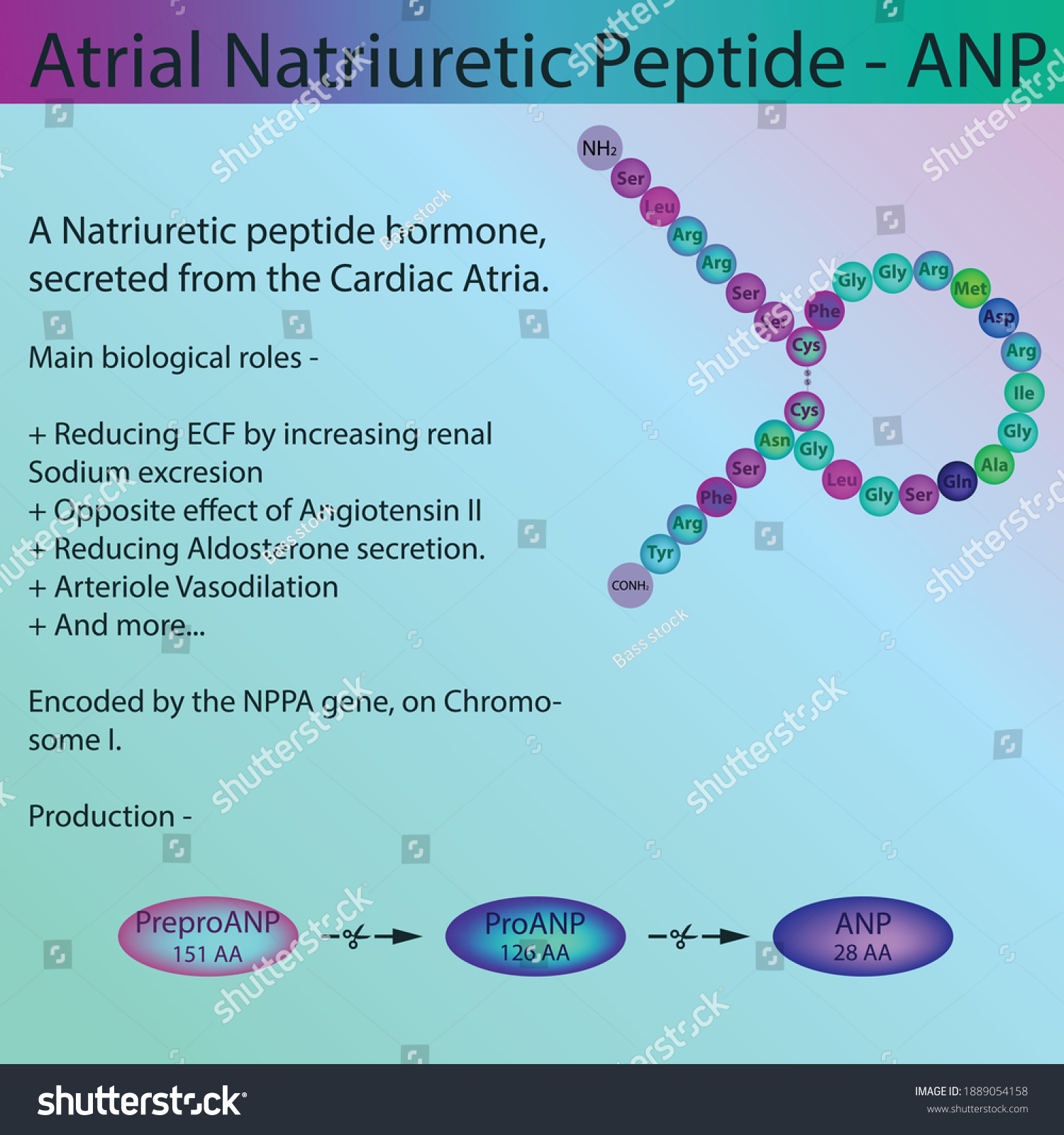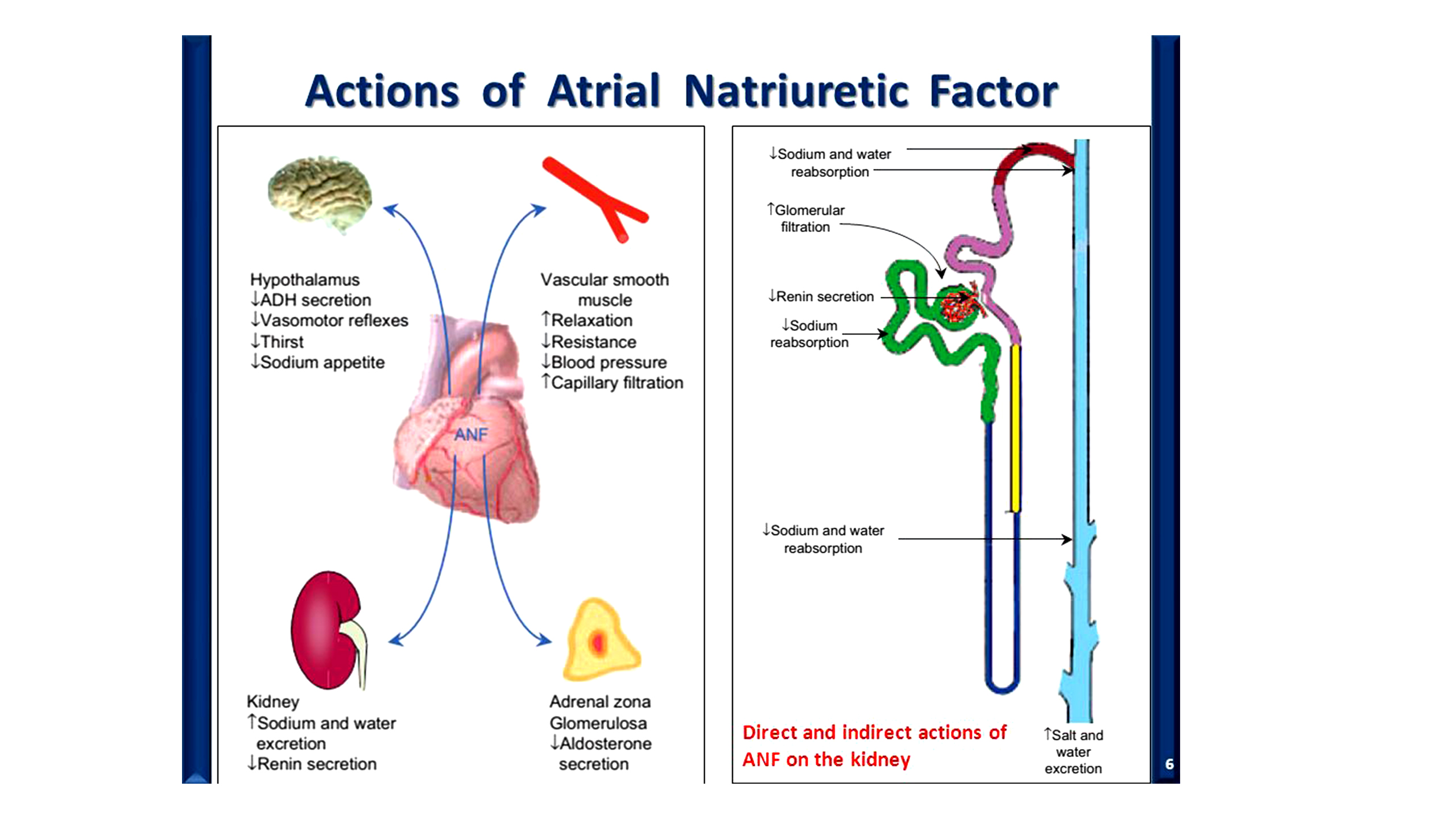Introduction
Atrial natriuretic factor (ANF) is a hormone produced by the heart that regulates blood volume and blood pressure. ANF is produced in the atria (the upper chambers) of the heart in response to increased pressure within the heart or increased blood volume.
Once released into the bloodstream, ANF works on the kidneys lead to increase in the excretion of salt and water, which reduces blood volume and blood pressure. ANF also acts on the blood vessels to cause them to relax and dilate, which further reduces blood pressure. Elevated levels of ANF are often seen in people with heart failure, indicating that the heart is struggling to pump blood effectively.
Structure of Atrial Natriuretic Factor
Atrial natriuretic factor is a type of peptide hormone that is produced and secreted by the heart. The structure of ANF consists of a linear chain of amino acids, which is folded into a specific 3-dimensional shape. ANF is synthesized as a large precursor molecule, called pro-ANF, which is then cleaved into its active form by proteolytic enzymes. ANF is secreted into the bloodstream by the heart and acts on specific receptors in the kidneys and blood vessels to produce its effects. The specific 3-dimensional structure of ANF is important for its biological activity, as it allows the hormone to bind to and activate its receptors.

Atrial Natriuretic Factor Production
Atrial natriuretic factor (ANF) is produced by the heart in response to increased pressure within the heart or increased blood volume. ANF is produced and stored in specialized cells in the atria (the upper chambers) of the heart, called atrial myocytes. When pressure or volume within the heart increases, ANF is synthesized and secreted into the bloodstream.
The production of ANF is regulated by a complex interplay of hormones and signaling pathways, which includes renin-angiotensin-aldosterone , the sympathetic nervous system, and other factors. ANF production is increased in conditions such as heart failure, where the heart is struggling to pump blood effectively, and decreased in conditions such as dehydration, where blood volume is low.
Physiological effects of ANF
Atrial natriuretic factor has several important physiological effects:
- Natriuresis: ANF acts on the kidneys to increase the excretion of salt (sodium) and water, which reduces blood volume and blood pressure.
- Vasodilation: ANF acts on blood vessels to cause them to relax and dilate, which further reduces blood pressure.
- Suppression of the renin-angiotensin-aldosterone system: ANF suppresses the production and action of the renin-angiotensin-aldosterone system, a hormone system that regulates blood pressure and fluid balance.
- Suppression of the sympathetic nervous system: ANF suppresses the activity of the sympathetic nervous system, thus regulating blood pressure.

Therapeutic and clinical significance of Atrial Natriuretic Factor
Atrial natriuretic factor (ANF) has both therapeutic and clinical significance due to its ability to regulate blood pressure and fluid balance.
- Therapeutic potential: ANF and its analogs have been studied as potential therapies for a variety of conditions, including heart failure, hypertension, and kidney disease. ANF therapy aims to mimic the physiological effects of the hormone and improve heart function, blood pressure, and fluid balance.
- Clinical significance: Elevated levels of ANF in the blood are associated with heart failure, where the heart is struggling to pump blood effectively. ANF levels can be measured as a diagnostic tool for the heart failure and monitor response to treatment. ANF levels are also increased in conditions such as dehydration, where blood volume is low, and reduced in conditions such as liver cirrhosis, where fluid balance is disrupted.
Summary
When the heart experiences increased pressure or blood volume, ANF is generated in the atria of the heart. When ANF is released into the bloodstream, it influences the kidneys to enhance sodium and water excretion, which lowers blood volume and blood pressure. ANF is produced in the bloodstream by the heart and exerts its effects by interacting with certain receptors in the kidneys and blood arteries. When the heart struggles to pump blood efficiently, such as in heart failure, ANF production rises; when blood volume is low, such as in dehydration, ANF production falls. ANF’s physiological effects The hormone atrial natriuretic factor, which is produced by the heart, has several significant physiological consequences.
Frequently Asked Questions
1. How does ANP prevent fibrosis?
ANP is thought to prevent fibrosis by several mechanisms:
- Inhibition of fibroblast activation: ANP has been shown to inhibit the activation and proliferation of fibroblasts, the cells that produce and deposit the fibrous scar tissue in fibrosis.
- Promotion of apoptosis: ANP has been shown to promote the apoptosis (programmed cell death) of fibroblasts, reducing the number of cells available to contribute to fibrosis.
- Inhibition of oxidative stress: ANP has been shown to inhibit oxidative stress, a key contributor to fibrosis, by reducing the production of reactive oxygen species and promoting antioxidant defense mechanisms.
2. How does the atrial natriuretic factor is triggered?
The main mechanisms by which ANF is triggered are:
- ANF is triggered by atrial volume receptors expanding the atrial wall.
- ANF is activated by an increase in sodium content.
3. What is the role of ANP in heart failure?
It regulates fluid balance and blood pressure in the body and has been shown to provide therapeutic advantages in heart failure patients. ANP levels are frequently raised in patients with heart failure as a result of the increased workload and pressure on the heart.
 Mission Statement
Mission Statement
“Empower every student to achieve full potential”
88Guru has been established with the social objective of making quality video-based learning material available to all Indian students. Technology, Connectivity and Social Media are rapidly changing the world of Education and we wish to lead the transformation of the tuition industry in India.
88Guru is the perfect complement to the current tuition model. 88Guru creates a wonderful opportunity for children and parents to bond while engaging in a valuable learning activity. It also provides the complete curriculum at your fingertips for those moments when you need some help at short notice. We believe that this mode of tuition could be transformational, adding hours to a child's day while providing complete control over the learning process.
Every course is taught by the best teachers from India's top schools and conducted in an engaging manner to keep students involved. The e-learning process consists of video-based instructions, computer-graded assignments, and a dashboard which allows the student and parent to track progress.


